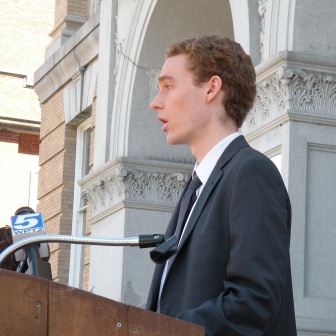Dozens turn out in lead up to special City Council session
For Immediate Release: August 29, 2012
MONTPELIER, VT—Less than a week after a majority of the Montpelier City Council rejected a long-planned upgrade to a wood fired boiler run by the state that would pump heat to municipal buildings and local businesses, dozens of Montpelier residents gathered in front of City Hall to urge their councilors to reconsider their votes.
“This project will significantly cut the money Montpelier taxpayers are currently paying to buy dirty oil,” said Ben Walsh, clean energy advocate for the Vermont Public Interest Research Group, which supports the project. “A year after Irene, it’s more obvious than ever that we need to do our part to cut global warming pollution. This project does that. Supporting it is the responsible decision. It’s the right decision for a clean heat future.”
The District Heat project would eliminate the need for Montpelier to purchase over 60,000 gallons of oil annually, but is at risk of being nixed. The plan has received public votes of support four times since 2003, including a vote just last summer, but last week the City Council voted to stop city staff from seeing the project to completion. That could change tonight when the City Council convenes again for a special session called by Mayor John Hollar, a project supporter, to consider revisions to the city’s agreement with the state.
“I’ve been a supporter of the District Heat plan from the beginning,” said City Councilor Angela Timpone, who cast one of two votes in support of the project last Wednesday. “It’s a smart investment that saves taxpayers money and protects the environment at the same time. I’m encouraged by the Mayor’s announcement, and hope that it convinces my fellow councilors to support the project moving forward.”
Vermont cities and towns are increasingly seeking opportunities to create local, community energy projects, as Johanna Miller, clean energy director of the Vermont Natural Resources Council, sees in her work coordinating a network of town energy committees. “Not only will this project help the City of Montpelier make the needed transition off fossil fuels,” says Miller, who also serves on Montpelier’s Energy Advisory Committee, “it also sets the standard for the kinds of biomass projects we should be building in Vermont by making efficient use of limited forest resources.”
The revised plan is expected to give the city more flexibility in determining the final scope of its portion of the project, but the city and state both expect it will ultimately result in the city moving forward with the full project, as laid out at last Wednesday’s meeting. Local residents welcomed the news, and the special session.
“As a member of the Energy Committee, I’m glad to hear the City Council is open to reconsidering its decision,” said Rebecca Wigg of the Montpelier Energy Advisory Committee, which has been working on the project since its inception. “As a young professional putting down roots in Montpelier, this project is one of the best examples I’ve seen that this city is the kind of forward-looking community we all know it is.”
District Heating systems similar to the Montpelier proposal are common in Europe, but are just beginning to be adopted in the United States. Several other Vermont communities, including Waterbury, Brattleboro and Randolph, have recently or are currently considering similar projects.
“Wood-fired district heat is, simply put, a smart way to heat,” said John Snell, partner in The Snell Group, a local company that works internationally on energy consulting. “If this project goes forward, Montpelier will be leading the nation and setting an example for cities of all sizes across Vermont and across the country.”
###

